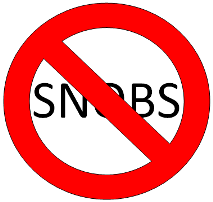
Are You a Sourcing Snob?
Ask yourself these questions:
- Is a candidate identified on LinkedIn intrinsically “better” than a candidate sourced from Monster?
- Is candidate sourced by cold calling inherently “better” than a candidate sourced from a job posting on Careerbuilder?
- Does it really matter where a great candidate comes from?
I continue to see well respected thought leaders in the staffing industry make claims that the quality of candidates on the job boards is low, and there seems to be no shortage of those in the recruiting and staffing industry who are happy to jump on that bandwagon. However, whenever I read or hear broad, sweeping statements claiming that an entire population of 50,000,000+ candidates is low quality just because they happen to be in an online resume database of a major job board – my response is a mix of shock and disappointment.
Stereotyping is Poor Judgement
Broad statements such as “the job boards have low quality candidates” reeks of stereotyping. A stereotype is an oversimplified conception or opinion based on the assumption that there are attributes that members of the “other group” (in this case, job board candidates) have in common. Stereotypes are often formed by an Illusory correlation , a false perception of an association between two variables where in fact none exists.
You just can’t go around claiming all job board candidates are bad. That’s like saying everyone in New York is rude, or that everyone in California is a hippie. To stereotype all job board candidates as low quality is downright insulting to the many fantastic people who make the decision to post their resume to well known online resume databases. If they only knew that posting their resume to a job board was equivalent to moving to “the wrong side of the tracks.”
Sourcing Snobbery
Many sourcers and recruiters use the Internet to source and identify candidates all the time, yet there is never a mention of the intrinsic “quality” of candidates who happen to post their resume on their own websites. As if creating a website and posting your resume to it somehow makes you a better person than someone who either doesn’t know how do do that or simply doesn’t care to, instead opting to post their resume to a well known job board site.
And what about Social Media? The last time I checked – there is no “candidate quality filter” built in to LinkedIn, Facebook, Twitter, or any social network. ANYONE can decide to create a web page or a Social Media profile, from “A” players to “F” players. Continue reading →
 There are people in the HR/recruiting industry who believe that searching databases, the Internet, and social networking sites to source talent is relatively easy and that it can be automated through the use of technology.
There are people in the HR/recruiting industry who believe that searching databases, the Internet, and social networking sites to source talent is relatively easy and that it can be automated through the use of technology.

